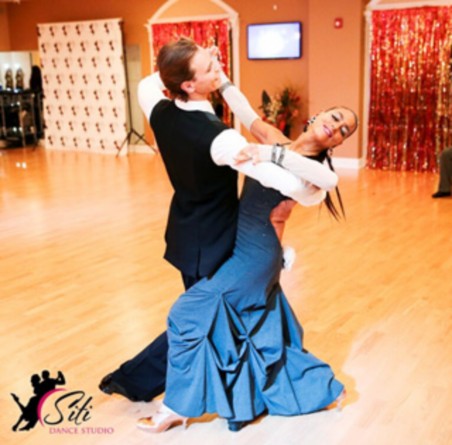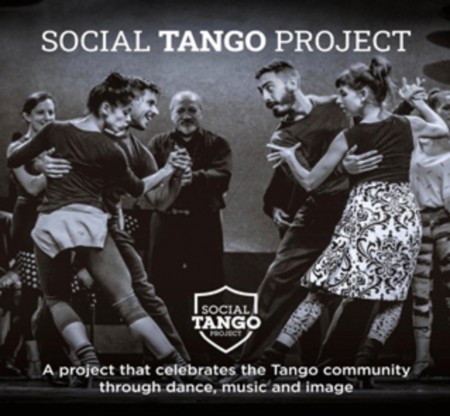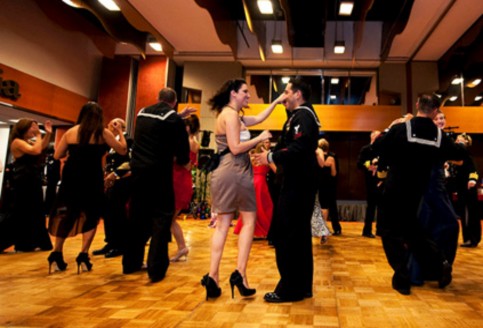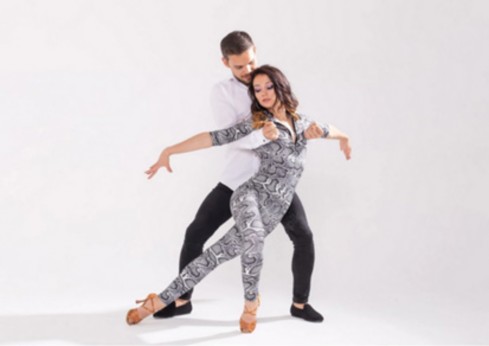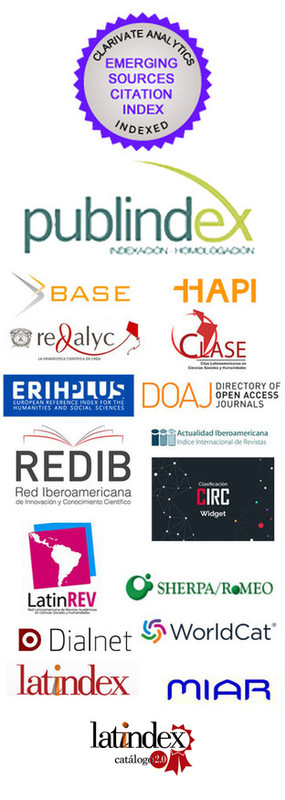
DOI:
https://doi.org/10.14483/21450706.22171Publicado:
2024-11-20Número:
Vol. 20 Núm. 37 (2025): Enero-junio 2025Sección:
Sección CentralDancing and artistic projects of the 20th-21st centuries (problems of intercultural dialog)
Danza y proyectos artísticos de los siglos XX-XXI (problemas del diálogo intercultural)
Dança e projetos artísticos dos séculos 20 e 21 (problemas de diálogo intercultural)
Palabras clave:
arte, proyecto artístico, arte danzante, diálogo intercultural, comunicación social (es).Palabras clave:
art, artistic project, dancing art, intercultural dialog, social communication (en).Palabras clave:
projeto artístico, dança-arte, diálogo intercultural, comunicação social (pt).Descargas
Referencias
Adshead-Lansdale, J., & Layson, J. (1994). Dance his- tory: An introduction. London; New York: Routledge.
Alferova, O. I. (2008). Visual art in the end of century – beginning of century: Summary for scientific degree of Doctor of Arts. Kharkov.
Babeshko, O. A. (2013). Features of students' self-actu- alization leisure. Analytica kulturologii, 2(26), 136-143.
Baglai, V. E. (2007). Ethnic choreography of peoples of the world. Rostov-on-Don: Feniks.
Bezuglaya, G.A. (2015). Musical analysis in the work of choreographic teacher. Study aid. Moscow: Planet of music, Lan.
Cohen-Stratyner, B. (2001). Social dance: Contexts and definitions. Dance Research Journal, 33(2), 121- 124. DOI:10.2307/1477809
Dils, A., & Albright, A. C. (2001). Moving history/danc- ing cultures: A dance history reader. Middletown, Conn.: Wesleyan University Press.
Dudinskaya, N. (2017). Life in art. St. Petersburg: St. Petersburg State University of Labor Unions.
Foulkes, J. L. (2002). Modern bodies dance and Ameri- can modernism from Martha Graham to Alvin Ailey.
Chapel Hill: University of North Carolina Press.
Herath, D., Kroos, C., & Steralc. (2016). Robots and art: Exploring an unlikely symbiosis. Singapore: Springer.
Kazhan, V. I., & Kalinina, R. P. (2012). Personal names and their sources in choreographic art terminology. Philological Studios, 6(2), 63-68.DOI: 10.31812/FILSTD.V6I2.734
Kostrovitskaya, V., & Pisarev, A. (2014). School of clas- sical dance. Moscow: Iskusstvo.
Kovaleva, A. I. (2004). Socialization. Knowledge. Un- derstanding. Skill, 1, 395-401.
Le Moal, P. (1999). Dictionnaire de la danse. Paris: Larousse.
McDonagh, D. (1990). The rise and fall of modern dance. Pennington, NJ: A Capella Books.
Meer, N., & Modood, T. (2012). How does intercultural- ism contrast with multiculturalism? Journal of Intercul- tural Studies, 33(2), 175-196.DOI: 10.1080/07256868.2011.618266
Penzina, E. V. (2012). Globalization phenomenon: Glo- balization and westernization. Bulletin of Krasnoyarsk State Agrarian University, 8(71), 228-233.
Prina, F., Zavakou, A., Ghirardi, F., & Colombo, S. (2013). Minorities, media and intercultural dialogue. ECMI working paper No. 71. European Centre for Minority Issues, Flensburg.
Ratzmann, N. (2019). Intercultural dialogue: A review of conceptual and empirical issues relating to social transformation. Management of Social Transforma- tions Programme (MOST) Discussion Papers 01. Paris: United Nations Educational, Scientific and Cultural Organization (UNESCO).
Scheff, H., Sprague, M., & McGreevy-Nichols, S. (2010). Exploring dance forms and styles: A guide to concert, world, social, and historical dance. Champaign, IL: Human Kinetics.
Semi, G., Colombo, E., Camozzi, I., & Frisina, A. (2009). Practices of difference: Analysing multiculturalism in everyday life. In A. Wise, & S. Velayutham (eds.), Ev- eryday multiculturalism (pp. 66-84). London: Palgrave Macmillan. DOI: 10.1057/9780230244474_4
Serdyuk, T. (2009) Choreography in bringing up stu- dents. Art and Education, 2, 22-25.
Sharikov, D. I. (2008). Classification of modern chore- ography: Trends, styles, types. Kiev: Karpenko V.M.
Sharikov, D. I. (2013). Art science choreology as the ar- tistic culture phenomenon. Choreography typology.Part III. Kiev: Kiev International University.
Skinner, J. (2013). Social dance for successful aging: The practice of health, happiness, and social inclusion amongst senior citizens. Anthropology & Aging Quar- terly, 34(1), 18-29. DOI: 10.5195/aa.2013.24
Smyth, M. M. (1984). Kinesthetic communication in dance. Dance Research Journal, 16(2), 19-22.DOI: 10.2307/1478718
Vasilieva-Rozhdestvenskaya, M. (2015). Historical folk dance. Moscow: Iskusstvo.
Woodin, J., Lundgren, U., & Castro, P. (2011). Tracking the traces of intercultural dialogue ininternationaliza- tion policies of three EU universities: Towards a frame- work. European Journal of Higher Education, 1(2-3), 119-134. DOI: 10.1080/21568235.2011.629038
Yakuba, Yu. V. (2017). To the issue of relevant quali- ties of a future choreographic teacher. In Musical and choreographic education in the context of society cultural development: Proceedings and abstracts of III International scientific-practical conference of young scientists and students, October 13-14, 2017, Odessa, Ukraine (vol. 2, pp. 109-111). Odessa: Kostiantyn Ush- insky South Ukrainian National Pedagogical University.
Zhuravleva,A.V. (2017). Theory and teaching method- ology of popular dancing styles. Kiev: Kiev National University of Culture and Arts.
Cómo citar
APA
ACM
ACS
ABNT
Chicago
Harvard
IEEE
MLA
Turabian
Vancouver
Descargar cita
Recibido: 16 de mayo de 2024; Aceptado: 1 de julio de 2024
Abstract
The article explores dancing and artistic projects from the 20th and 21st centuries within the framework of intercultural dialogue, focusing on choreographic art as a means of reconstructing everyday reality. It highlights the role of social dance and physiologicalrehabilitation classes in facilitating productive intercultural communication. Through effective analysis, the study identifies trends in dance art that contribute to advancing choreographic mastery. The investigation emphasizes the positive impact of choreographic sessions, particularly in art therapy, revealing improved psychological states among participants. Social dancing is shown to have therapeutic benefits and social value, fostering group cohesionand personal growth. Ultimately, the study underscores how social dance influences task completion, team spirit, and personal identity formation, thereby enhancing dancing mastery and individual development.
Keywords
art, artistic project, dancing art, intercultural dialog, social communication.Resumen
El artículo explora la danza y los proyectos artísticos de los siglos XX y XXI en el marco del diálogo intercultural, centrándose en el arte coreográfico como un medio para reconstruir la realidad cotidiana. Se destaca el papel del baile social y las clases de rehabilitación fisiológica en facilitar una comunicación intercultural productiva. A través de un análisis efectivo, el estudio identifica tendencias en el arte de la danza que contribuyen a avanzar en la maestría coreográfica. La investigación enfatiza el impacto positivo de las sesiones coreográficas, particularmente en la arteterapia, al mejorar los estados psicológicos de los participantes.
Se muestra que el baile social tiene beneficios terapéuticos y valor social, pues fomenta la cohesión grupal y el crecimiento personal. Finalmente, el estudio subraya cómo el baile social influye en la realización de tareas, fortaleciendo el espíritu de equipo y la formación de la identidad personal, lo cual potencia la maestría en la danza y contribuye al desarrollo individual.
Palabras clave
arte, proyecto artístico, arte danzante, diálogo intercultural, comunicación social.Résumé
L'article explore la danse et les projets artistiques des 20e et 21e siècles dans le cadre du dialogue interculturel, en mettant l'accent sur l'art chorégraphique comme moyen de reconstruire la réalité quotidienne. Le rôle des cours de danse sociale et de réadaptationphysiologique dans la facilitation d'une communication interculturelle productive est mis en évidence. Grâce à une analyse efficace, l'étude identifie les tendances de l'art de la danse qui contribuent à faire progresser la maîtrise chorégraphique. La recherche met l'accent sur l'impact positif des séances chorégraphiques, notamment en art-thérapie, en améliorant les états psychologiques des participants. Il est démontré que la danse sociale a des avantages thérapeutiques et une valeur sociale, car elle favorise la cohésion de groupe et la croissance personnelle. Enfin, l'étude met en évidence comment la danse sociale influence l'exécutiondes tâches, renforçant l'esprit d'équipe et la formation de l'identité personnelle, ce qui améliore la maîtrise de la danse et contribue au développement individuel
Mots clés
art, projet artistique, art de la danse, dialogue interculturel, communication sociale.Resumo
O artigo explora os projetos de dança e artísticos dos séculos XX e XXI no âmbito do diálogo intercultural, centrando-se na arte coreográfica como meio de reconstrução da realidade quotidiana. O papel das aulas de dança social e reabilitação fisiológica nafacilitação da comunicação intercultural produtiva é destacado. Por meio de uma análise eficaz, o estudo identifica tendências na arte da dança que contribuem para o avanço do domínio coreográfico. A pesquisa enfatiza o impacto positivo das sessões coreográficas, particularmente na arteterapia, melhorando os estados psicológicos dos participantes. A dança social demonstrou ter benefícios terapêuticos e valor social, pois promove a coesão do grupo e o crescimento pessoal. Por fim, o estudo destaca como a dança social influencia no desempenho das tarefas, fortalecendo o espírito de equipe e a formação da identidade pessoal, o que potencializa o domínio da dança e contribui para o desenvolvimento individual.
Palavras-chave
projeto artístico, dança-arte, diálogo intercultural, comunicação social.Introduction
The processes of universal evolutionism which underlies the present world view is critical to any analysis of the modern state of culture,. The modern integra- tive movement in the sphere of intercultural relations has a character which is multifaceted, multifactor,and above all, global, falling under the umbrella of globalization (Kazhan & Kalinina, 2012; Penzina, 2012; Ratzmann, 2019). Artistic culture and art more broadly acquires significant importance in intercultural com- munication in a poly-cultural space under the condi- tions of globalization (Erarth et al., 2016; Kostrovitska- ya & Pisarev, 2014; McDonagh, 1990). The processes taking place today in the field of artistic culture are complicated and contradictory, and their genesis is equally unclear. They are dualistically directed and are distinguished simultaneously by their moderniza- tion and their inclination towards destruction.In this context, the relevance of this study is due to both the analytical and practical nature of the material presented therein.
The aim of this article is to reveal the essence of so- cial dance and clarify its psychological, pedagogical, and rehabilitational feat, which is performed with the help of analytical (historical and genetic, comparable, commeasurable, and functional) and empirical (ob- servational and interrogative) investigation methods. We believe that with the help of the system-functional model it is possible to demonstrate the psychological potential of social dances as a way of harmonizing the communicative sphere of personality, which is relevant from the point of view of both theoretical and practical psychology.
A number of key tasks need to be completed to achieve the determined objective:
1.Conducting an effective qualitative literature review on the investigation topic.
2.Substantiating the relevance of investigation methods and materials.
3.Presenting an effective visualization of the results which constitute the main aim of the work.
4.Representing the interaction between the efficiency of intercultural dialogue and the essence of actual dancing and artistic projects of the 20th-21st centuries within the framework of delineating the problems of modern choreographic art.
5.The practical significance of this investigation lies in the applied character of the results, which can be further utilized in classes on artistic mastery in the institutions which train future teachers in the sphere of choreographic art.
Materials and methods
The following investigation methods were selected for this project: descriptive (analysis of foreign and domestic literature), empirical (based on interroga- tion of the data), and illustrative (data visualization). The relevant materials used for the investigation included searches in both domestic and foreign databases of scientific literature), as well as empirical (observational and pedagogical) analysis. The effi- ciency of practical and theoretical approaches was positively assessed, since we managed to complete the tasks and reach the desired aims.
Literature overview
The strengthening of the ground-breaking political and economic position of European countries and the USA had had a clear and significant impact on harmonic interaction in the framework of intercul- tural dialogue (Penzina, 2012). Under globalization, we should understand the use of exchange but not accept the dominance of one country over another one, aiming instead towards equitable intercultural dialogue (Le Moal, 1999). The modern state of Russian society and public relations requires an active posi- tion and reaction to social problems on the part of workers within the cultural sphere.
Russian society, regarding which many questions and few answers still remain, requires decisive changes. According to Alferova (2008)art is now considered as a multilayer, flexible, open system which represents the cultural component. It suggests new points of view of the world, recording the human experience which is still unknown beyond one’s own boundaries due to previously non-aestheti- cized spheres of human existence. (p. 4)
An awareness of social dance, a concept originally limited to ballroom choreography, as the newest dance genre first appears in the scientific literature of Great Britain at the end of the last century in the works of T. A. Waitworth, R. Powers, and others.Later, researchers and pedagogical choreographers began to actively explore Latin American popular dances and jazz club dance culture (Julieta McMayes, Norma Miller, Scott Capit, etc.). The question of popular dance styles in Russia is actively studied byA. V. Zhuravleva and D. I. Sharikov (Prina et al., 2013; Sharikov, 2008; Zhuravleva, 2017). At the same time, the psychological, pedagogical, and rehabilitational aspects of social dance in the domestic scientific space has gone virtually unstudied. Our study draws on findings from the intersection of cultural studies, sociology, psychology, and art history (Adshead- Lansdale & Layson, 1994; Cohen-Stratyner, 2001; Dils & Albright, 2001; Meer & Modood, 2012; Prina et al.,2013; Ratzmann, 2019; Semi et al., 2009; Woodin et al., 2011). Among the sources, the main place is oc- cupied by works on contemporary choreographic theory and practice (Foulkes, 2002; McDonagh, 1990; Scheff et al., 2010; Yakuba, 2017; Zhuravleva, 2017).
Results
In the 20th century, choreographic art has been going through the onslaught of modern choreography and social dance is its original variety. Dance schools and studios are opening all over the world and new dance styles and trends are being developed. This passion for dance is being sustained and reinforced by the media; there are an increasing number of dance festi- vals and programs broadcast on television and widely covered in the press. There is also a whole industry devoted to the production of dance video tutorials, distributed on CDs and on the Internet, especially on social networks, where communities, typically groups of amateur and professional dancers, are being created. Despite the fact that today there are many varieties of choreographic art, we turn our attention to social dances, which, in our opinion, are the most indicative in terms of the main characteristics of modern culture.
The concept of "social dances" implies all kinds of dances that are not professional and are accessible to all, but are still characterized by certain rules and accepted movements and require certain skills and abilities. With a high proportion of improvisation, the construction of such dances is not chaotic, but is defined by set, basic elements. Nevertheless, the dances addressed here do not contain strict and complex sequences that must be memorized andperformed with filigree precision. Moreover, they do not require much space on the dance floor. The main feature of all social dances is their accessibility. Most types of social dances began to develop actively in the 1980-1990s. Many social dance trends, a number of which originate from Latin American choreogra- phy, appeared with the emergence of club music and the active development of discos. Nowadays social dances are more popular than ever. Many performers of other disciplines study them and bring their cho- reographic skills to them, which lends some sophisti- cation and grace to styles originally associated with street dance, offering a new perspective of these different dance styles.
The most popular trends of modern social dances include: swing, zouk, tango, hustle, salsa, bachata, merengue, and reggaeton. Each of these dances has its own characteristic features, but taken together they form a complex of a huge number of folk, histori- cal, ballroom, and modern dances that emerged with the desire to express oneself, and one’s thoughtsand emotions in movement. Social Latin Americandances like hustle, bachata, and salsa stand out for their unique energy, sense of fun, sensuality, and lightness. Since the 20th century, these styles have had a firm place in the culture of America, Europe, and Russia. The central principle of social dances is leading. Most of them are paired, and the dancermust, above all, be able to competently "lead" their partner, who, in turn, responds and complements the dance with her movements. Another important feature of social dances is that you can improve your skills in the discipline not only in the classroom or on stage or during competitions and contests. You can dance these styles at any party, as well as in themed clubs and festivals around the world. These dances exist due to the desire of people to communicate, to derive pleasure from the artform, and to energize each other with their sincere joy. Dance becomes ameans not only for leisure, but also for self-expression of a person's personality and potential. An additional motivation can be to maintain a good level physical fitness. These dance disciplines actively influence the communicative side of society, allowing people to comfortably communicate and interact regardless of social affiliation. People of different nationalities and language groups who are fond of social dancing are able to come to another country and always havethe opportunity to find people with similar interests. Today, in our troubled society, the psychological, pedagogical, and rehabilitational potential of dance acquires yet more significance. The realization of this potential in a country such as Russia, with conditions of political and social instability, facilitates a partial bal- ancing of the situation, thus indicating the widespread popularity of social dancing and the broad variety of its functions.
Physiological rehabilitation and art-therapy can be combined in social dance classes to acquire the maxi- mum psychological rehabilitation result at the final stages (Bezuglaya, 2015; Woodin et al., 2011). Art-ther- apy sessions are actively used for this (Figure 1), en- abling participants in this process to get the maximum result within the framework of correctional classes with psychological consultants. For many participants in these artistic events, art-therapy is an indispensable component, which directly indicates the harmony between the different sides of human nature.
The methodology of arranging choreographic classes in social dances, such as salsa, bachata, and kizomba consists of the following stages:
1.Investigation of the main movements of the dance as a group in the dancehall.
2.Practical classes in pairs in the dancehall, changing partners throughout the session.
3.Dancing in social units at “open-air” parties, etc.
One relevant social dancing project is the use of tango to realize the artistic potential of young pairs (Figure 2). In the framework of the presented proj- ects, youth can not only understand the basics of dif- ferent countries’ cultures but also engage positively in an intercultural communication experience. This is highly important for implementing projects of inter- cultural dialogue.
Figure 1.
Figure 2.
The results of the investigation revealed a positive effect of choreographic classes, after which respon- dents demonstrated an improved general psychologi- cal state, general state of health. Moreover, changes to respondents’ outlooks on their futures were revealed, and positive opinions were expressed.The principal approach which was proposed for the mastering of social dances such as salsa, bachata, and kizomba, was influenced by rehabilitational, correctional, and preventive methodologies and can be recommended for different social categories.
Figure 3
Figure 4.
Following the results of observation and interroga- tion, we can assert that social dancing classes (Figures 3, 4) contribute to the development of courage in young people as the gender roles are deliberately varied here. These classes contribute considerably to making social contact and establishing the balance between the participants of the session regarding age and gender.
Discussions
The modern social, economic, political, and psycho- social situation in the Russian Federation is being actively discussed and considered by the representa- tives of different scientific communities. In this regard, it is impossible to overestimate the rehabilitational effect of a social dance in restoring the psycho-emo- tional state of people who were harmed as a result of military actions, different depressive states, stressors, professional degradation, etc. At the same time, social dance can perform recreational, hedonistic, and even cultural and artistic functions (Serdyuk, 2009). The results of the historical and genetic analysis of the art of dance demonstrated that the selection and sys- tematization of movements and positions of a human body as the means of creating an artistic image has occurred culturally and historically (Foulkes, 2002).
For example, Russian dance imitates the movements of a bird; in Bashkir folk dances, the arm movements “beshbarmak” imitate the pinning out; in the old French dance of woodcutter’s “bourree” (literally– “brushwood bundle”), the dancers roughly stamp down and jump after each third step as if pressing the collected brushwood with rough wooden boots (Ba- glai, 2007; Semi et al., 2009). Modern choreographyis the newest type of choreographic art and culture formed under the influence of the social, political, philosophical, technological, and stylistic factors of the culture of the 20th century, which featured impro- visation and individuality in dance and stabilized the synthesized structure.D. Sharikov (2008) believes that there was no place for social dance in the modern classification of chore- ography until 2008.
Later the same author proposed its definition as a social type of choreographic art and culture formed under the influence of historical and social factors of artistic art in the field of folk, historical, academic, ballroom, and Latino dance, which is not limited to partner or group dancing according to the rules and standards of competitive events (Sharikov, 2013). It should be pointed out that social and youth choreographic genres (competi- tive ballroom dance, among which country, swing, salsa, oriental, merengue, mambo, lambada should be highlighted) are mainly advertised to groups of dif-ferent ages (teenagers, youth, young people, adults, and elderly people) as leisure activities done for the purpose of having a good time or organizing profes- sional competitions where social dance is character- ized as a social and youth discipline (Babeshko, 2013).The results of the scientific literature analysis demon- strated that the development level of social dance facilitates a proportional growth in interest in other related disciplines, to the extent that the art of danc- ing gradually shifts to a new level (Scheff et al., 2010; Vasilieva-Rozhdestvenskaya, 2015). With the lack of clear sequences, the technique of leading the female- partner, whose main task is to feel the male-partner’s impulses and aesthetically and attractively complete her movements, acquires great importance. In the cul- tural life of some countries, contests of different types of social dances and even carnivals play an important role.In contrast to popular competitive and ballroom dances, the pairs on the “social” dance floor are not permanent.
The participants’ psyche does not be- come exhausted from “competition syndrome”, and the partners change arbitrarily. In ballroom dance, pairs must be together over a long period of time, gradually demonstrating their achievements through competition, but social dance mainly exists within the realm of leisure (Zhuravleva, 2017). From the exten- sive list of social dances, we consider salsa, bachata, and kizomba the most widely spread and popular in Russia (Cohen-Stratyner, 2001; Skinner, 2013).The comparable and commeasurable analysis of the scientific literature allowed us to determine the main functions of social dance. These are communicative, self-identifying, expressive, cathartic, hedonistic, health-improving, and rehabilitational. Let us consider the most important of them: social dance embodies the feelings that are natural to a human being. Dance can enhance, discipline, and feed an individual’s sense of self.
The recreational and hedonistic functions of social dance consist in the realization of aesthetic pleasure connected with the performance of harmonic move- ments to an agreeable, musical rhythm and the attain- ment of spiritual and physical satisfaction. This allows these categories to be qualified as falling under the umbrella of art psychology (Yakuba, 2017). Further- more, social dance also involves the time-tested function of hedonism, which makes it an indispens- able way of expressing the gamut of human emotions. The necessity of developing harmonic feeling and the lack of imbalance in the partners’ movements make social dance an optimal and functional feature of interpersonal and spatial interaction.The social basis of modern performances of solo and pair dances also contributes to the realization of therecreational function of dance. Social and recreation- al TV programs, various parties, family and profes- sional events, leisure evenings in recreational places (clubs, restaurants, cafes, etc.) contribute heavily to the recreational dimension of social dance. Taking into account the indicated functions of social dance, let us consider salsa and kizomba in more detail. Salsa (Spanish – “a sauce”) is a modern social dance popu- lar in the USA and Latin America, which is danced in pairs or groups. Kizomba (Portuguese – “to move slowly”) is a popular modern pair dance, as well as a musical genre originating in Angola, which evolved in Portugal and became popular in France (Dudinskaya, 2017; Smyth, 1984). At the moment, Paris is the trend- setter in modern kizomba. Kizomba is unique among social dances, requiring dancers to be intertwined with one other through micro-impulses.Investigating the question of the function of social dance in Russia demonstrated that today, due to so- cial and political tension, the rehabilitational function of social dance is becoming increasingly important among its main functions. For involved partners, the harmony of a social dance is equated with the forma- tion of opportunities for spontaneous improvisation (Kovaleva, 2004). Driven by the eurhythmy of move- ments, the pair tries to make contact with reality and the world around them and obtain a new level of understanding of the capabilities of their own bodies and minds. Through the movements and plasticity of the body, a dancer can learn to manipulate their body and dance so well that the audience will be amazed at their mastery of the artform and will notice the pro- fessional qualities of the dancers. Furthermore, social dance is another way of demonstrating to the outside world the strength of the bonds between cultures within the framework of international dialogue and the exchange of experiences.
Conclusions
The determination of the nature of social dance allows us to assert that it constitutes a wide base, which can be optimally used in the frameworks of the modern intercultural dialogue. Today in Russia the rehabilitational function of social dance is becoming increasingly important among its main functions. A step-by-step technique of organizing choreographic classes in social dance styles (salsa, bachata and kizomba) comprises three stages: studying the basic dance movements as a group in the dancehall; practi-cal classes in pairs in the dancehall, changing partners regularly; dancing in social units at “open-air” parties, etc.
Further research could potentially aim at correct- ing existing curricula and study programs regarding the number of available credits, contact hours, etc., and refining the content of study courses on social dance introduction for their inter-coordination and harmonization.At the same time, social paired dancing can act as a method to comprehensively address and improve a number of key areas in public policy, as social danc- ing encourages people to lead normal, active, and socially adapted lifestyles. They are an accessible alternative to spending free time for all categories of citizens, regardless of their gender, age, place of residence, physical features, etc.In practice, intercultural dance projects of the 20th- 21th centuries differ not only in their malleability but also in the high quality of improvisation they entail. For many dancers, the participation in such projects envisages opportunities for advanced training and the improvement of professional skills.
However, this comes with multiple challenges, the resolution of which in practice involves establishing frameworks for intercultural dialogue proportionally to the estab- lishment of the frameworks of the world outlook. In such context, for our fellow countrymen dance rep- resents another avenue for self-fulfillment through art and sublimation of basic instincts and emotions inher- ent to human nature. Through the prism of this new reality, individuals can leave ordinariness and acquire new skills of interaction with society, achieved only through the art of improvisation and spontaneous realization of artistic impulses.
References
Licencia
Derechos de autor 2024 Tatiana Portnova

Esta obra está bajo una licencia internacional Creative Commons Atribución-NoComercial-CompartirIgual 4.0.
Licencia actual vigente
Creative Commons BY NC SA - Atribución – No comercial – Compartir igual. Vigente a partir del Vol. 17 No. 32: (julio-diciembre) de 2022.
This work is licensed under a https://creativecommons.org/licenses/by-nc-sa/4.0/deed.es
Licencias anteriores
- Desde el Vol. 14 Núm. 25 (2019) hasta el Vol. 17 Núm. 31: enero-junio de 2022 se utilizó la licencia Creative Commons BY NC ND https://creativecommons.org/licenses/by-nc-nd/4.0/deed.es
- Desde el Vol 1 Num 1 (2007) hasta el Vol. 13 Núm. 23 (2018) la licencia fue Creative Commons fue Reconocimiento- Nocomercial-Sin obras derivadas 2.5 Colombia https://creativecommons.org/licenses/by/2.5/co/

